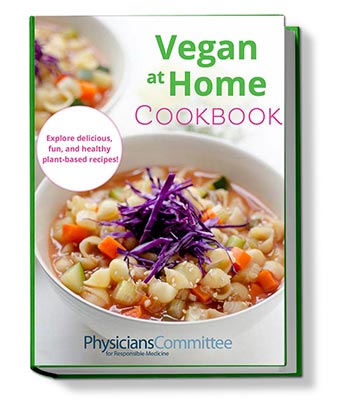Foods To Boost Mood During COVID-19 Social Distancing

Nutritious food plays an important role in how we feel physically and mentally.
No matter what we eat, getting through this pandemic is going to be a stressful time, which is why we should use every tool we can to help combat stress, depression, and anxiety.
Removing animal products—including meat and dairy—from the diet can be helpful for improving mood and reducing depression and anxiety. Two large studies point to the mood-boosting effects of fruits and vegetables.
In a study of nearly 50,000 individuals in the United Kingdom, those consuming more vegetables and fruits reported substantially better mental well-being and life satisfaction, compared with those who neglected these healthful foods. And the more vegetables and fruits they ate, the better they did on these measures.
Another study in Taiwan examined the diets of 1,609 older adults, finding that those who ate the most vegetables were 62% less likely to develop depressive symptoms.
Focus on Folate
In explaining the apparent antidepressant effect of plant-based foods, researchers have credited folate, a B vitamin found in broccoli, spinach, asparagus, and many other vegetables. Folate appears to play a role in the synthesis of serotonin, a neurotransmitter involved in mood.
If you are stocking up on pantry staples, look for dried (or canned) chickpeas, beans, and lentils—all excellent sources of folate. It’s also a great time to get the more affordable, folate-packed (and just as nutritious) broccoli, peas, and spinach from the freezer section!
Power Up on Plant Protein
Avoiding meat is likely to benefit your mood, and it is easy to get all the protein you need from beans and other plant sources. A large study in Spain found that people eating very little meat were less likely to experience depression. The researchers found that diets built mainly from plant sources were associated with a 26% reduction in the risk of depression, with a particular benefit from beans, nuts, and fruits.
Stock up on frozen fruit and make smoothies to power up your morning routine. Adding soy milk or other plant milk can give you an extra protein boost. Bonus, you can also buy non-refrigerated plant milk in the pantry section of your store, which can live in your cabinet until opened.
For a quick protein boost, nuts are a great salad and oatmeal topper. Chop up a handful of pecans and sprinkle them on a bowl of oatmeal with some frozen fruit for another delicious breakfast option.
Fill Up on Fiber
Plant foods provide fiber, which helps the digestive tract. In turn, that seems to protect against depression. Data from the National Health and Nutrition Examination Survey showed that the more fiber people ate, the less likely they were to be depressed. Beans, vegetables, fruits, and whole grains provide fiber, but there is zero fiber in meat, eggs, and dairy products.
There are two types of fiber: soluble and insoluble.
Soluble fiber helps lower cholesterol. How? Soluble fiber acts like a sponge, soaking up waste cholesterol in your digestive tract and then whisking it out of the body. You’ll find soluble fiber in oats, beans, lentils, vegetables, and some fruits.
Insoluble fiber—found in whole grains, fruits, vegetables, beans, and bran—acts like a broom, cleaning your digestive tract.
Enjoy Soy
Dairy products contain casomorphins, or mild opiates that are released as milk is digested. Swedish researchers discovered that, when highly concentrated, casomorphins can have a dramatic effect on the brain. However, soy products like tofu and soy milk contain isoflavones which may help stabilize mood. Studies suggest that consuming two to four soy servings per day may significantly boost mood.
The most healthful soy products are those that are minimally processed so they retain all of their original nutrients. Soy products include soybeans, or edamame, and any other items made from soybeans, including soy milk, tofu, tempeh, miso, and plant-based meat and dairy substitutes like soy meats and soy cheeses.
Calm Inflammation
Depression relates to inflammation in the body and low levels of serotonin. Plant-based foods naturally lower inflammation in the body because they are naturally low in fat and rich in antioxidants. High vegetable intake increases the amount of B vitamins in the diet, which have been found to affect mood.
Researchers have suggested that an excess of arachidonic acid, an inflammatory fat found in chicken, eggs, beef, sausage, and fish, can promote inflammation in the brain and interfere with normal brain function. Eating a plant-based diet allows you to avoid these inflammatory foods and suggests an explanation for the antidepressant effect of a plant-based diet.
Don’t Forget Vitamin D
With many of us self-isolating and not spending as much time out in the sun, it’s important to make sure we are getting enough vitamin D. Research has shown that vitamin D might play an important role in regulating mood and warding off depression. A clinical trial published in The Journal of Internal Medicine showed those with higher serum levels of vitamin D scored better on depression scales with fewer depressive symptoms when compared to those with lower serum levels. Physicians Committee researchers found that low-fat, plant-based diets in the corporate setting improved productivity and alleviated symptoms of anxiety and depression.
Fortified cereals, grains, bread, and soy or rice milk exist as options for providing vitamin D through diet, but supplements are available and equally as beneficial.
Many of these foods also give an immune-boosting bonus, In addition to basic protections—like handwashing and social distancing—adopting a healthful, plant-based diet can help keep illness at bay.
References
- Jorde R, Sneve M, Figenschau Y, Svartberg J, Waterloo K. Effects of vitamin D supplementation on symptoms of depression in overweight and obese subjects: randomized double blind trial. J Intern Med. 2008;264:599-609.
- Agarwal U, Mishra S, Xu J, Levin S, Gonzales J, Barnard ND. A multicenter randomized controlled trial of a nutrition intervention program in a multiethnic adult population in the corporate setting reduces anxiety and improves quality of life: The GEICO Study. Am J Health Promot. 2015; 4:245-254.
Vegan At Home Cookbook
Download our free e-book with more recipes to get started on a plant-based diet! Fill out the form below and the download link will be delivered to your email inbox.









